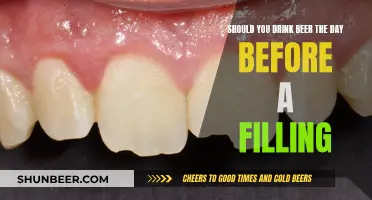
Alcohol-induced headaches are extremely common and can be caused by a variety of factors. These include the diuretic effect of alcohol, which leads to dehydration, as well as the presence of ethanol, histamine, and congeners in alcoholic drinks. While the exact mechanism is not fully understood, it is known that alcohol can trigger migraine, cluster, and tension-type headaches. Red wine is often reported as a trigger, but other alcoholic beverages such as beer, white wine, and liqueurs can also cause headaches. Sensitivity to specific ingredients, body weight, and genetic factors may also play a role in alcohol-induced headaches.
| Characteristics | Values |
|---|---|
| Type of headache | Immediate alcohol-induced headache (cocktail headache), Delayed alcohol-induced headache (hangover headache) |
| Time taken to set in | Immediate: within 3 hours of drinking, Delayed: 5-12 hours after drinking |
| Duration | Up to 72 hours |
| Pain type | Pulsating or throbbing |
| Pain location | Both sides of the head |
| Other symptoms | Aggravated by physical activity, Fatigue, Nausea, Vomiting, Lightheadedness |
| Causes | Dehydration, Ethanol, Histamine, Congeners, Genetic factors, Sensitivity to specific ingredients, Body weight, Ethnicity, Gender |
What You'll Learn

Dehydration
Drinking alcohol can also cause dehydration by affecting the kidneys, which regulate fluid levels in the body. Alcohol causes the kidneys to excrete more fluid, leading to excessive urination and further contributing to dehydration. This dehydration can cause a headache even after a small amount of alcohol.
To prevent dehydration-induced headaches, it is essential to stay hydrated when consuming alcohol. Drinking plenty of water before, during, and after alcohol consumption can help maintain fluid levels in the body and reduce the risk of a headache. Sports drinks with electrolytes can also help with rehydration.
In addition to dehydration, alcohol can trigger headaches through other mechanisms. For example, alcohol contains ethanol, which dilates blood vessels and can trigger migraine attacks in certain individuals, especially those prone to headaches or migraines without alcohol. Alcohol also contains histamine and stimulates the production of this compound in the body, which can cause vascular headaches.
The type of alcohol may also play a role, with dark-coloured alcohols like red wine, brandy, and whiskey containing higher levels of congeners, which have been linked to headaches. Additionally, substances such as sulfites, histamine, and tyramines found in alcohol may contribute to headaches.
Beer and Aleve: A Safe Mix?
You may want to see also

Histamine
In addition to histamine, other substances in alcohol, such as sulfites and tyramines, may also contribute to headaches.
Mixing Beer and Wine: Safe or Not?
You may want to see also

Ethanol
The amount of ethanol ingested can vary depending on the type of alcohol consumed. Dark-coloured alcohols like red wine, brandy, and whiskey may contain higher levels of congeners, which have been linked to headaches. Clear liquors like gin and vodka are thought to have fewer congeners and may be less likely to cause headaches.
The effects of ethanol intoxication on the brain are quite pleasurable at first, leading to feelings of relaxation and happiness. However, as more ethanol is consumed, negative effects such as blurred vision, slowed reaction times, impaired perceptions, and loss of inhibitions occur. At higher concentrations, ethanol can cause hiccups, vertigo, confusion, lethargy, memory loss, vomiting, stupor, coma, slowed breathing, and even death.
The mechanism by which ethanol causes its various effects is not fully understood, but once absorbed into the bloodstream, it can freely enter nerve cells in the brain. This leads to a chemical release that results in pleasurable feelings and reduced inhibitions. As more ethanol molecules enter the nerve cell membranes, sedating effects develop.
While the exact role of ethanol in triggering headaches and migraines is not fully known, it is clear that it plays a significant role in the development of these conditions for many individuals.
Beer and Tylenol: Safe After a Few Hours?
You may want to see also

Congeners
Research has shown that dark forms of alcohol, such as bourbon, dark beers, and red wines, contain higher levels of congeners, leading to increased discomfort after drinking. In a study, 33% of participants who drank bourbon relative to their body weight reported a severe hangover, compared to only 3% of those who drank the same amount of vodka.
The carbonation in beer speeds up the absorption of alcohol in the body. Therefore, drinking beer before liquor gives the body less time to process the toxins, which can contribute to a more severe hangover.
While the type of alcohol may influence the likelihood of a headache, individual factors such as sensitivity to specific ingredients, body weight, ethnicity, and genetic predisposition also play a role in headache development after drinking beer.
Is Your Beer Safe?
You may want to see also

Genetic factors
Genetic predisposition is a factor that influences whether an individual will experience a headache after drinking beer. Research has shown that certain genes play a role in an individual's sensitivity to alcohol. These genes are involved in the opioid, serotonin, and dopamine systems, which can affect the likelihood of experiencing symptoms such as headaches after drinking small amounts of alcohol.
A 2017 study found that people of East Asian ancestry tend to drink less than members of other ethnic groups, and this may be influenced by genetic factors. Additionally, individuals from different ethnic backgrounds may have variable sensitivity to alcohol due to genetic differences.
It has been suggested that the tendency to experience alcohol-induced headaches could be genetic. Researchers have found that people who experience unpleasant effects from drinking alcohol, such as headaches, tend to consume less alcohol or abstain from it altogether. Studies have also shown that alcohol abuse disorders are less common among individuals who experience alcohol-induced headaches, indicating that a predisposition to these headaches may offer some protection from alcohol overuse.
Furthermore, alcohol may impact serotonin nerve transmission, which has been linked to headaches in some individuals. Serotonin is one of the nerve chemicals involved in central pain control, and it is believed to play a role in hangover headaches.
While genetic factors can influence an individual's sensitivity to alcohol and the likelihood of experiencing headaches, other factors such as ethnicity, body weight, and additives in alcohol also contribute to the development of alcohol-induced headaches.
Pumping and Drinking: Is It Safe to Mix?
You may want to see also
Frequently asked questions
Beer contains ethanol, a natural diuretic that causes you to urinate more than usual, leading to dehydration, which is a common cause of headaches.
A cocktail headache typically occurs on both sides of the head and has a pulsating or throbbing quality. It can last up to 72 hours.
To prevent a headache, it is recommended to drink plenty of water before, during, and after consuming alcohol. Eating honey before drinking may also help due to its high levels of vitamin B6.
To treat a headache after drinking beer, it is recommended to drink plenty of water or sports drinks to rehydrate. Taking an over-the-counter pain reliever such as ibuprofen or acetaminophen can also help alleviate the pain.







